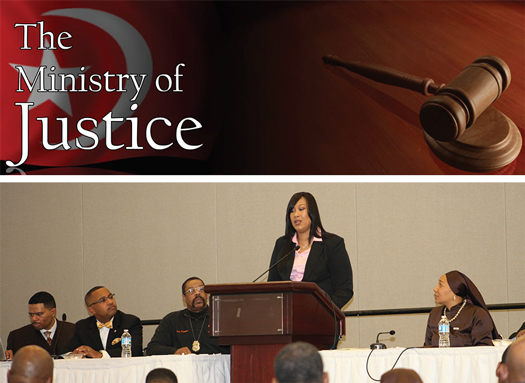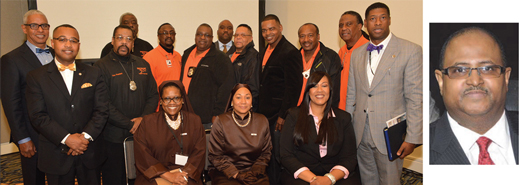Accountability, proactive measures in the fight for justice
By Brian E. Muhammad -Contributing Writer- | Last updated: Mar 9, 2017 - 10:48:28 AMWhat's your opinion on this article?

A wide-array of panelists presented valuable information during the Ministry of Justice workshop.
|

Lawyers, judges and other legal professionals along with community activists participated in the Ministry of Justice workshop during Saviours’ Day 2017. | Photo insert: Attorney Arif Muhammad
|
DETROIT (Cobo Center)—Conflict resolution, community policing, establishing civilian complaint review boards and policing the police was discussed in the Ministry of Justice Workshop at Saviours’ Day 2017.
The justice ministry is one of nine established to serve the needs of communities. The panelists were professionals and individuals involved in the justice system and community. “Justice is the birthright of every human being … a prerequisite to life,” says the website for the Justice or Else movement. Justice is an eternal principle, Freedom, Justice and Equality, not conferred by the U.S. Constitution, but the Creator, notes www.justiceorelse.com.
Panelists agreed that America has a problem where Black, Brown, Red and poor Whites are constantly on the losing end of receiving justice. They said, however, to tackle the problem you must properly diagnose it.
“If you are going to police in the Black community you need to understand that the condition that you see among our people is a condition that is socially engineered,” said Demetric Muhammad, researcher and author of “How to Police the Black Community: Divine Guidance for Law Enforcement.”
“It’s not an organic development,” he said. “It is by design.” The researcher advocates solutions advanced by the Most Honorable Elijah Muhammad, patriarch of the Nation of Islam. Bro. Demetric also pointed out how popular culture was weaponized and used to create degenerate conditions which lends to the problem.
Judge Nichelle Johnson Muhammad—who is the first Muslim appointed to the City Court in Mount Vernon NY—said along with law, proper perception of people is also key.
“Everyone can be saved; we should never believe we are in an irretrievable spot,” said Judge Johnson Muhammad. The judge raised the importance of Civilian Complaint Review Boards as a mechanism for police accountability. She revealed having such boards is legislated in most cities and told the audience its advantages if independent and the pitfalls if not structured to empower the community.
A “truly independent” board, she explained, must have subpoena powers; the ability to receive civilian complaints directly. It must have investigatory powers and staff; conduct independent hearings and issue discipline as appropriate. It must have auditing powers of police policies and procedures and suggest changes that would stick.
“We don’t want the Civilian Complaint Review Board to be under the arm of the police,” Judge Johnson Muhammad asserted.
Imhotep Blue is a law enforcement professional who organizes community policing through the Detroit 300 organization advocates community policing. “I believe right here in Detroit we have community policing that’s working,”
The Detroit 300 works alongside law enforcement and other organizations like Crime Stoppers to curb crime in the community. He said more must be done other than incarcerating people. “Once we establish true community policing and get an understanding of who’s in our community and what they’re doing … a lot of that crime will go down,” he said.
Student Minister Willie Muhammad from New Orleans discussed setting up conflict mediation centers advocated in the 10,000 Fearless initiative called by the Honorable Minister Louis Farrakhan at the 20th anniversary of the Million Man March in 2015.
“We see this as a proactive initiative, you and I know both that when somebody has lost their life things get complicated,” Student Minister Willie Muhammad remarked. “We not trying to be reactive,” he added.
He stressed engaging people in the streets, pointing out although a conflict hotline exists; only 17 percent of requests are from the line. Most requests come through relationships with those involved in the initiative.
Workshop participants weighed in too. Organizer Cephus “Uncle Bobby” Johnson raised the need to highlight Black people working on the problems of fratricidal violence and the needs of victim families. “We have organizations in our communities that are doing the work,” Mr. Johnson told The Final Call.
He said Black mass media should portray the efforts to counter the false narrative of White media that Blacks aren’t concerned about issues happening between Blacks.
“They always try to throw that trick in there to make Black folks say ‘well you’re right, why are we concerned about police when we got to clean up our own neighborhood,’ well we are,” said Mr. Johnson.
INSIDE STORIES AND REVIEWS
-
-
About Harriett ... and the Negro Hollywood Road Show
By Rabiah Muhammad, Guest Columnist » Full Story -
Skepticism greets Jay-Z, NFL talk of inspiring change
By Bryan 18X Crawford and Richard B. Muhammad The Final Call Newspaper @TheFinalCall » Full Story -
The painful problem of Black girls and suicide
By Charlene Muhammad -National Correspondent- » Full Story -
Exploitation of Innocence - Report: Perceptions, policies hurting Black girls
By Charlene Muhammad -National Correspondent- » Full Story -
Big Ballin: Big ideas fuel a father’s Big Baller Brand and brash business sense
By Bryan Crawford -Contributing Writer- » Full Story






 Click Here Stay Connected!
Click Here Stay Connected!








